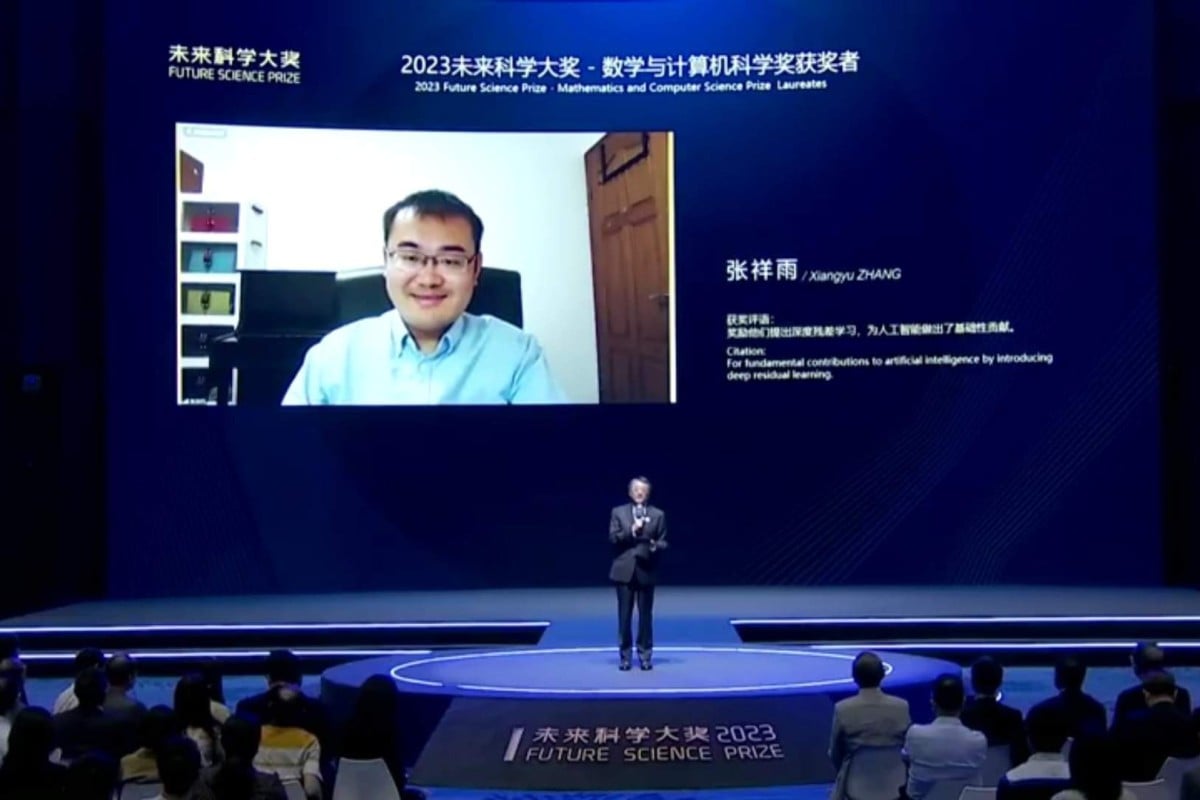
- Dr Zhang Xiangyu among researchers to win Mathematics and Computer Science award for deep residual learning tech that has paved the way for ChatGPT
- Prize recognises scientists who have made groundbreaking scientific and technological achievements in the Greater China region
 Artificial intelligence researcher Dr Zhang Xiangyu is the youngest laureate in the history of the Future Science Prize. Photo: Handout
Artificial intelligence researcher Dr Zhang Xiangyu is the youngest laureate in the history of the Future Science Prize. Photo: HandoutArtificial intelligence researcher Dr Zhang Xiangyu couldn’t believe his ears when he learned he had become the youngest laureate in the history of the Future Science Prize.
“I thought it was a scam when I first received the phone call about the award, so I just hung up quickly,” said Zhang, who is in his early 30s and received his PhD in pattern recognition and intelligent systems from Xian Jiaotong University in Xian, China in 2017.
It took several more calls from the prize committee before Zhang realised he had actually won the award.
Scientists discover that universe is awash in gravitational waves, as predicted by Albert Einstein
“Previous recipients have always been remarkable scientists, so it seemed impossible for someone from the ‘post-1990 generation’ like me to receive such recognition,” he explained.
Last week, Zhang and three other researchers – He Kaiming, Ren Shaoqing and Sun Jian, the late chief scientist of Megvii Technology – won the Future Science Prize in Mathematics and Computer Science for introducing deep residual learning, technology which has paved the way for artificial intelligence advancements such as ChatGPT. Their research was undertaken at Microsoft Research Asia in Beijing between 2012 and 2016.
They were among the eight winners of the 2023 Future Science Prize. The award, which was initiated in 2016 as the country’s first privately funded science award, recognises scientists who have made groundbreaking scientific and technological achievements in the Greater China region.
It encompasses three categories – Life Science, Physical Science, and Mathematics and Computer Science – with an award of US$1 million (HK$7.84 million) for each category.
The Physical Science prize went to physicists Zhao Zhongxian and Chen Xianhui for their discovery of high-temperature superconducting materials.
Superconductivity is the remarkable phenomenon of conducting electric current without resistance and has vast potential in energy transmission, transport, computation, and communication. While traditionally observed at extremely low temperatures (<-230 °C), the discovery of high transition temperature superconducting materials can significantly propel these applications.
Zhao led a team that independently discovered the first superconducting material above the temperature of liquid nitrogen in 1987.
About 30 years later, Chen’s group became the first to raise the transition temperature above the McMillan limit – the name given to what was previously thought to be the maximum temperature possible for these materials – confirming their unconventional nature.
“If room-temperature superconductivity were discovered, it would bring about a revolutionary change in people’s lives,” Chen said, envisioning what advancements it could bring in the future. “[We could] ride on levitating superconductive vehicles, and mobile phones and laptops could last for months on a single charge.”
What’s so electric about room-temperature superconductivity? Here’s how it could change our world
Chen encouraged young researchers to adhere to original innovation. “Many young people have a mentality of pursuing immediate success and tend to engage in repetitive work. However, it is crucial to think independently, as it is the wellspring of innovation,” he said.
Zhou Jianmin and Chai Jijie received the Life Science prize for discovering resistosomes and elucidating their molecular structures and functions in plant immune responses against pathogens.
“I feel extremely thrilled to receive this award, and I am so glad that the prize can notice and support issues related to agriculture,” said Zhou, who has often talked with fruit farmers in his research.
Scientists work to advance brain implants to help people with paralysis, nerve diseases
Plant diseases have had a significant impact throughout history. According to the UN Food and Agriculture Organization, up to 40 per cent of global food production is lost yearly due to pests and diseases.
Researchers have long hypothesised that plants have innate immune systems to defend against pathogens, and this hypothesis was proved molecularly by cloning the first plant resistance genes in 1994. However, the molecular functions of the immune receptors encoded in the resistance genes remained a mystery before the breakthrough made by Zhou and Chai’s team in 2019.
Zhou and Chai’s discovery has provided key information for developing better methods to control plant disease and could even help increase food security.
Zhou recognised his family’s role in his winning the prize.
“Over the years, I have not spent enough time with family, but they have shown understanding and support. This award is also dedicated to them,” Zhou said.
The Future Science Prize award ceremony will take place on October 17 at the Hong Kong Palace Museum – the first time it will be held in the city. A Future Science Prize Week will be launched from October 14 to 17 to foster scientific knowledge and curiosity in Hong Kong youth.
